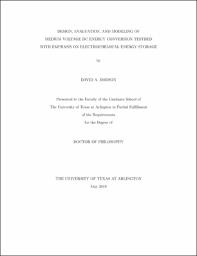
ATTENTION: The works hosted here are being migrated to a new repository that will consolidate resources, improve discoverability, and better show UTA's research impact on the global community. We will update authors as the migration progresses. Please see MavMatrix for more information.
Show simple item record
| dc.contributor.advisor | Wetz Jr., David A. | |
| dc.creator | Dodson, David Alan | |
| dc.date.accessioned | 2019-05-28T20:54:43Z | |
| dc.date.available | 2019-05-28T20:54:43Z | |
| dc.date.created | 2019-05 | |
| dc.date.issued | 2019-05-06 | |
| dc.date.submitted | May 2019 | |
| dc.identifier.uri | http://hdl.handle.net/10106/28103 | |
| dc.description.abstract | Much work has been done in recent years regarding the emphasis and newfound importance of energy storage and energy conversion within systems that, at one time, functioned off of simple alternating current (AC) busses. With the advancement in technology has come unique and demanding electrical loads and equipment, creating a need for many different electrical topologies and requirements. The scope of the work done here is related to current efforts and interests in islanded microgrid power systems. Microgrid electrical systems are evolving and new, demanding electrical systems are being invented and introduced. For example, advancements in communication and sensor systems has brought with it increasing electrical demands, specifically demands that occur in a transient manner. With these new electrical demands placed upon the islanded power system of a microgrid, new system topologies have risen up to meet these unique and transient requirements. Some of these topologies include the presence of medium voltage DC distribution busses within these systems to supply these new loads efficiently, as well as the inclusion and integration of energy storage used to augment traditional rotational generation in the event that a high power transient electrical load is placed upon the system.
The inclusion of these topological changes has shown a need for modeling and evaluation of these newer, more complex systems. As these power systems become more complicated, there is an increasing number of variables that need to be considered in the integration of new systems. Energy conversion is important between the different, growing numbers of busses in place, and the evaluation of the different interactions between these busses has proven to be an expensive and difficult task to perform at the full multi-megawatt level of a typical commercial microgrid power system.
The work presented here is to create a testbed of equipment and controls that are representative of this modern power system architecture, including a multitude of busses with both AC and DC voltages at different levels. These different voltage levels are to be tied together with various power electronic converters, such that energy can be transferred around the system as needed. Many different electrical loads will be implemented, in the form of traditional constant base loads and varying, transient loads of different pulse shapes and characteristics. The interactions and implications these loads have with the power system as a whole will be studied, including impacts on power quality and efficiency. These systems will operate at a power level that is more attainable than the multi-megawatt microgrid power system level, but one that is still significant enough to offer valuable insight into the operation of real, representative equipment. The power range utilized throughout this system will be between 100 and 300 kW, operating at voltages including 480 VAC three-phase, 4160 VAC three-phase, 1000 VDC, 6000 VDC, 12000 VDC.
The specification of equipment will be presented here, along with a fundamental model of the system for analysis. | |
| dc.format.mimetype | application/pdf | |
| dc.language.iso | en_US | |
| dc.subject | Medium voltage DC | |
| dc.subject | Energy storage | |
| dc.subject | Energy conversion | |
| dc.subject | Hardware-in-the-loop | |
| dc.subject | Power quality | |
| dc.title | DESIGN, EVALUATION, AND MODELING OF MEDIUM VOLTAGE DC ENERGY CONVERSION TESTBED WITH EMPHASIS ON ELECTROCHEMICAL ENERGY STORAGE | |
| dc.type | Thesis | |
| dc.degree.department | Electrical Engineering | |
| dc.degree.name | Doctor of Philosophy in Electrical Engineering | |
| dc.date.updated | 2019-05-28T20:54:44Z | |
| thesis.degree.department | Electrical Engineering | |
| thesis.degree.grantor | The University of Texas at Arlington | |
| thesis.degree.level | Doctoral | |
| thesis.degree.name | Doctor of Philosophy in Electrical Engineering | |
| dc.type.material | text | |
Files in this item
- Name:
- DODSON-DISSERTATION-2019.pdf
- Size:
- 45.60Mb
- Format:
- PDF
This item appears in the following Collection(s)
Show simple item record


